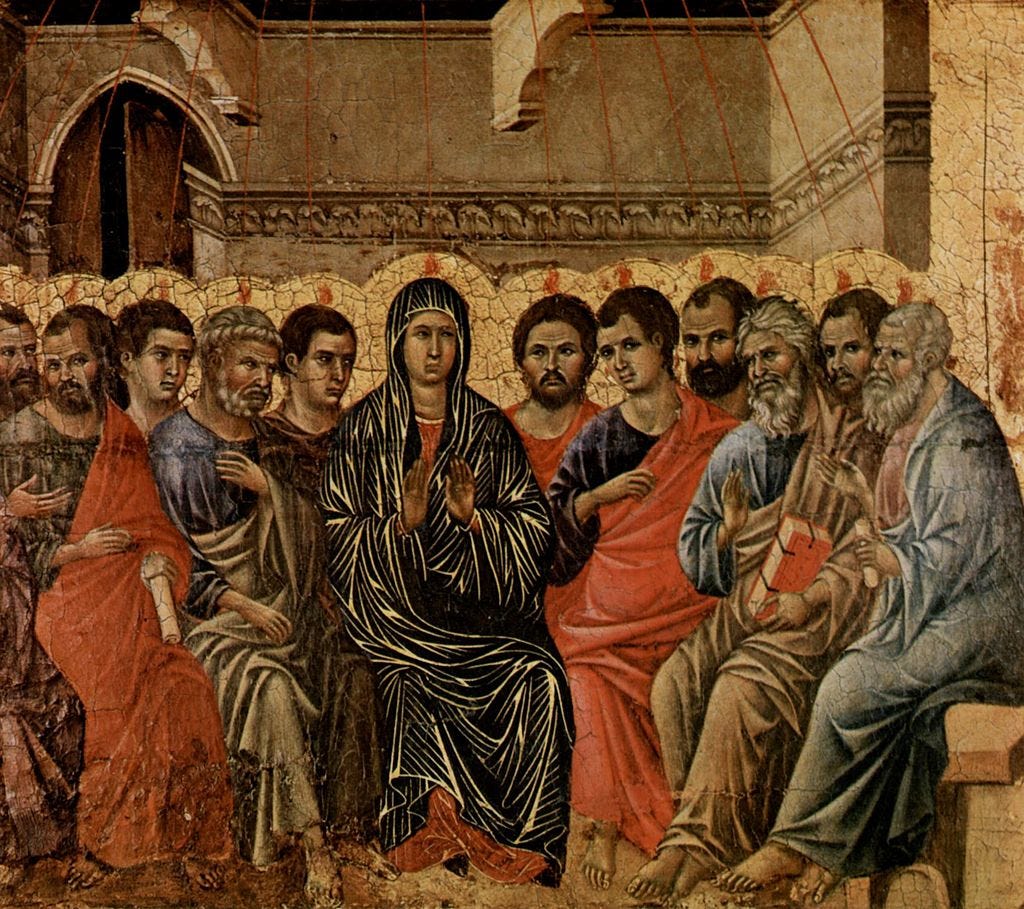The Fiftieth Day - Pentecost
The Feast of Pentecost
The name “Pentecost” comes from the Greek word meaning “fiftieth.” Like Easter, it is tied to a Jewish feast. 49 days (7 weeks, or “a week of weeks”) after the second day of Passover, the Jews celebrated the Feast of Weeks (Shavuot).
Passover celebrates the freeing of the Jews from slavery; Shavuot celebrates their becoming God’s holy people by the gift and acceptance of the Law; and the counting of the days to Shavuot symbolizes their yearning for the Law.
From a strictly practical point of view, Shavuot was a very good time for the Holy Spirit to come down and inspire the Apostles to preach to all nations because, being a pilgrimage festival, it was an occasion when Jerusalem was filled with pilgrims from many countries.
Symbolically, the parallel with the Jews is exact. We are freed from the slavery of death and sin by Easter; with the Apostles, we spend some time as toddlers under the tutelage of the risen Jesus; and when he has left, the Spirit comes down on us and we become a Church.
Source: Universalis
A Reflection by Pope Benedict XVI
On his way up to Jerusalem Jesus declared to his disciples: I came to cast fire upon the earth; and would that it were already kindled! (Lk 12:49). These words were most visibly brought about fifty days after the Resurrection, at Pentecost. The real fire, the Holy Spirit, was brought to the earth by Christ. He did not steal it from the gods like Prometheus, according to the Greek myth, but rather made himself the mediator of the gift of God, obtaining it for us with the greatest act of love in history: his death on the cross. In turn Jesus Christ constituted the Church as his Mystical Body so that she might extend his mission in history. Receive the Holy Spirit, the Lord said to the apostles on the evening of the Resurrection. Accompanying these words with an expressive gesture, he breathed on them. In this way he showed that he was communicating his Spirit to them.
Now in today’s solemnity Scripture tells us once again how…to receive the gift of the Holy Spirit. [The first reading] recalls that the disciples were all together in one place. This place was the Upper Room where Jesus had eaten the Last Supper with his apostles, where he had appeared to them risen—that room that had become, so to speak, the headquarters of the nascent Church…. This also applies to the Church today, it applies to us. If we want to prevent Pentecost from being reduced to a mere rite or even an evocative commemoration, but want it to be an actual event of salvation, we must prepare ourselves in devout expectation for the gift of God through humble and silent listening to his Word….
Lastly, a final thought may also be found in the account of the Acts of the Apostles: the Holy Spirit overcomes fear. We know that the disciples sought shelter in the Upper Room after the arrest of their Lord and that they had remained isolated for fear of suffering the same fate. After Jesus’ Resurrection their fear was not suddenly dispelled. But here at Pentecost, when the Holy Spirit rested upon them, those men emerged fearless and began to proclaim the Good News of the crucified and risen Christ to all. They were not afraid because they felt they were in the hands of the strongest One. Yes, wherever the Spirit of God enters he puts fear to flight; he makes us know and feel that we are in the hands of an Omnipotence of love. His infinite love does not abandon us. It is demonstrated by the witness of martyrs, the courage of confessors of the faith, the undaunted zeal of missionaries, the frankness of preachers, and the example of all the saints, even some who were adolescents and children. It is demonstrated by the very existence of the Church, which despite the limitations and sins of men and women continues to cross the ocean of history, blown by the breath of God and enlivened by his purifying fire.
Today’s Mass Collect
O God, who by the mystery of today’s great feast sanctify your whole Church in every people and nation, pour out, we pray, the gifts of the Holy Spirit across the face of the earth and, with the divine grace that was at work when the Gospel was first proclaimed, fill now once more the hearts of believers.
Through our Lord Jesus Christ, your Son, who lives and reigns with you in the unity of the Holy Spirit, God, for ever and ever.



